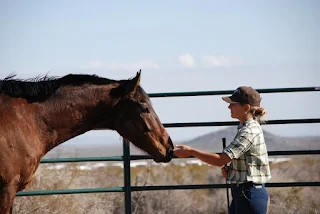"It is okay that you aren't the horse trainer, your horse still recognizes your efforts."
I was recently discussing with a long time clinic host the evolving journey of self-growth and awareness folks unintentionally experience as they strive to be better partners for their horses.
So here are a few ideas I hope people can carry with them:
You don't know what you don't know. As you learn more, don't judge your past decisions and interactions with your horse. Simply learn what caused you to make them and how you could make improved decisions in the future.
You aren't a horse trainer, and that is okay. There is a fine line between inspiring folks as to what can be, and not overwhelming them with what currently is. I find the challenge is keeping folks inspired to keep trying to learn how to refine and improve the conversations and support they offer to their horse, without overwhelming them because they will never be as capable as "the trainer."
As long as you are trying, your horse will recognize your efforts. Unfortunately society has created the idea of the "trained" horse. This illusion gets a lot of riders into sticky situations as they constantly rely on the horse to take care of them offering limited support in return. Eventually the horse reaches a point of being unable to handle their job solo and then unwanted behaviors occur as they ask and show they need support from the rider.
I suggest appreciating what the horse is willing to offer in the areas the rider may be unsure, BUT in other aspects when the person has clarity and capability, to offer guidance to the horse.
Instead, I suggest people think of the partnership with their horse as a continually evolving journey. There is no "end point" for anyone involved with the horses; every horse has something to teach everyone who is willing to hear them.
Riders should appreciate wherever they may be currently in their own journey of horsemanship AND still be open for improvement. Because there is no "end point" in how folks raise their awareness, improve their communication and refine their skill set, it can easy to get swept into the vicious cycle of self doubt with a stifling effect on the relationship with their horse.
I'd rather people recognize what they currently CAN do to help their horse, and see self-growth as a positive opportunity and not wallowing in self-critique of what "they aren't good enough" to do.
Every moment is an opportunity to learn with the horse. Unfortunately folks who allow their emotions to filter their interpretation of an experience limit their ability to take the "feedback" from the horse as vital information that can help them make different decisions in how they approach their horsemanship.








